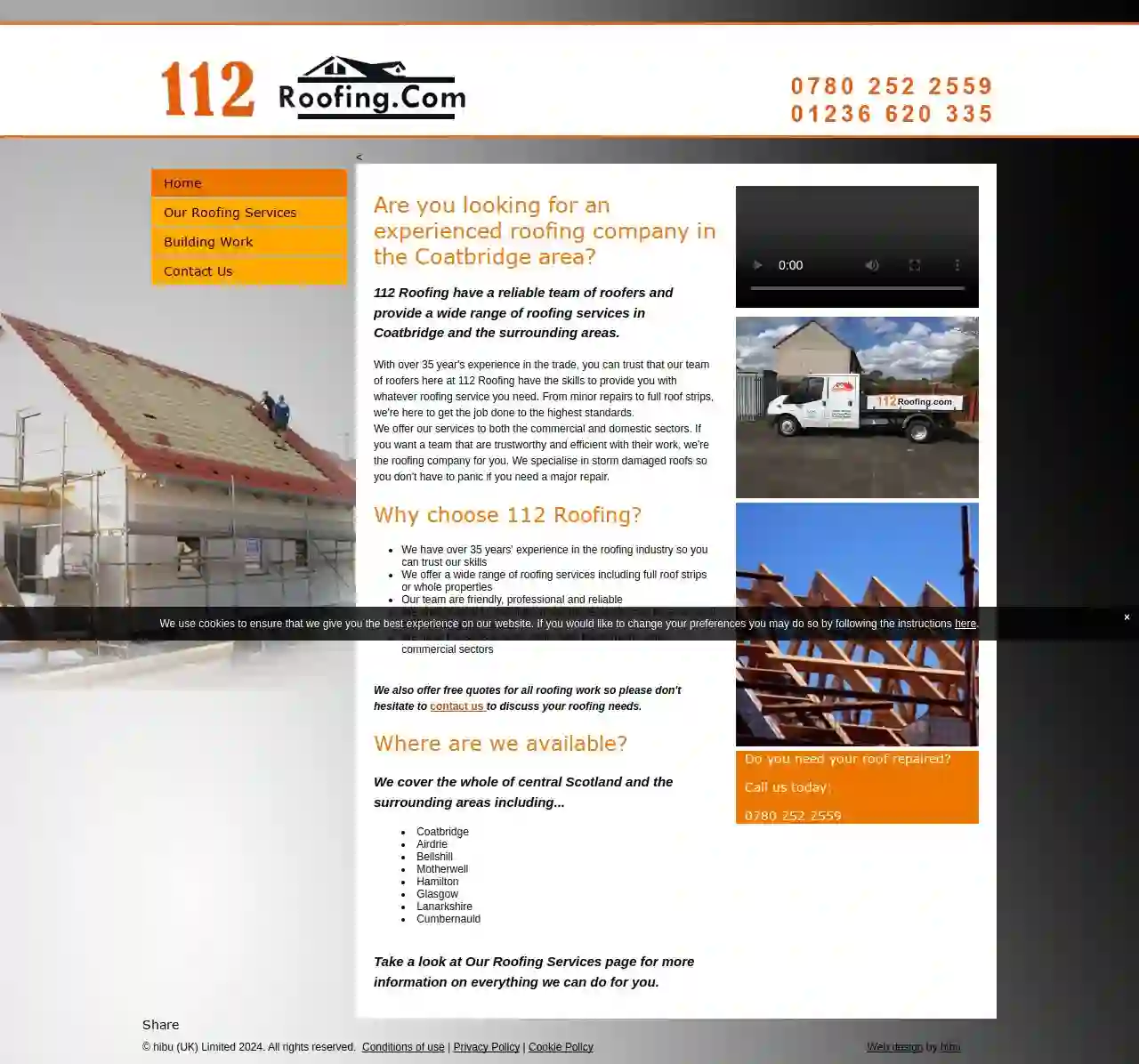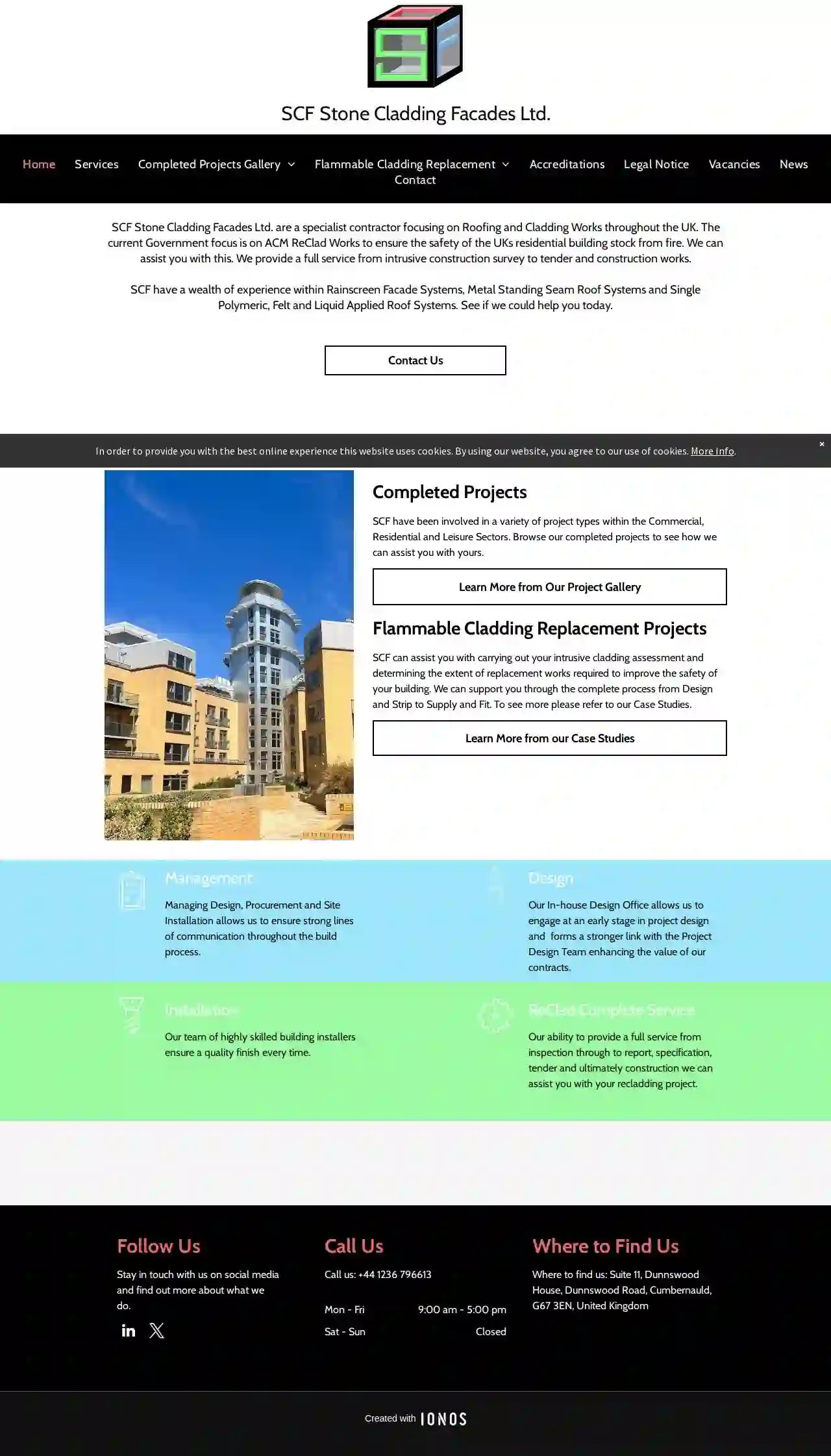Roofing Companies Clackmannan
Best Roofing Contractor in Clackmannan
Get 3 FREE Roofing Contractor quotes for your project today! Compare profiles, reviews, accreditations, portfolio, etc... and choose the best service.

PROTECT Roofing& roughcast specialists
517 reviewsLeving Place, Livingston, GBWelcome to PRO-TECT Roofing Looking for a roof repair or new roof? PRO-TECT Roofing are specialists in slating and tiling homes or commercial buildings. Our team can do a thorough job of making sure that your roofing requirements are exactly met with a eye for attention to detail our aim is 100% customer satisfaction and we won't settle for nothing less. Get complete peace of mind knowing our work is guaranteed and we are full liability insured so you know your property is in safe hands.
- Services
- Why Us?
- Testimonials
- Gallery
Get Quote
Easy Way Roofing
56 reviews4 Braille Drive, Renfrew, PA4 0DL, GBWelcome to Easy Way Roofing. We provide an affordable and professional roofing service to Glasgow,Stirling & surrounding area. We offer FREE no obligation estimates. We have many years of experience in the roofing industry, giving you peace of mind when requesting our services. We specialise in providing a reliable, honest and competitive service, with customer satisfaction a high priority. Whether you need us to replace your roof, carry out some property maintenance work, or provide roof repairs, please get in touch with Easy Way Roofing today.
- Services
- Why Us?
- Testimonials
- Gallery
Get Quote
Miro's Roofing and Building
55 reviewsFalkirk, GBWith over 25 years of experience, Miro's Roofing and Building team will carry out your work with professionalism and efficiency. We cover all areas of Forth Valley, Glasgow & Edinburgh.
- Services
- Why Us?
- Gallery
Get Quote
Quinn Roofing & Building Ltd
55 reviews24 Dover Heights, Dunfermline, KY11 8HS, GBQuinn Roofing & Building Ltd is a reliable roofing and building company based in Dunfermline, serving Fife, Edinburgh, and the Lothians. We pride ourselves on providing first-class roofing services with a customer-centric approach. Our team of experienced tradesmen boasts over 20 years of combined experience in both domestic and commercial sectors, ensuring high-quality workmanship across all aspects of roofing and building. We offer a comprehensive range of services, including tiling, slating, flat roofing (single ply and built-up felt), and roughcasting. At Quinn Roofing & Building, we value customer feedback and strive for complete satisfaction. We are proud to be a trusted member of the community and support local initiatives like James McCracken Racing.
- Services
- Why Us?
- Our Team
- Testimonials
- Gallery
Get Quote
AF Roofing
4.775 reviews26 Cockburn St, Falkirk, FK1 5BG, GBAF Roofing have over 10 years experience providing roofing solutions to homeowners and commercial property owners in Falkirk and it’s surrounding areas. We have developed a reputation based on quality and total professionalism, offering high quality services at affordable prices. Falkirk is a beautiful town, filled with wonderful walks, fantastic sights and man maid structures such as the Kelpies, The Falkirk Wheel, Callendar House, Blackness Castle and much more. Living and working in Falkirk means we know how important reputation is and we have built our family business over a decade by putting our customers first. if you are looking for quality workmanship at reasonable prices then welcome to AF Roofing. AF Roofing not only support residential works, we also support commercial roofing too – meaning some of the world’s leading brands trust our abilities to deliver outstanding results on time, to budget and most importantly to standard. We have become synonymous for our high standards.
- Services
- Why Us?
- Our Team
- Testimonials
- Gallery
Get Quote
McDonald Roofing Contracts Ltd
4.73 reviewsUnit 18, Armadale Industrial Estate, Unit 18 Armadale Industrial Estate Armadale West Lothian, Armadale, EH48 2ND, GBMcDonald Roofing Contracts is a family run business established since 1989. Over the last two decades we have been delivering high quality service to our customers across the central belt of Scotland. Based in Armadale in West Lothian our reputation has grown with domestic homeowners and contractors including local Authorities and Developers. All professional roofers employed with the company have completed their specialty training which is undertaken regularly to maintain and develop their skills. At McDonald Roofing we pride ourselves on our commitment to providing a professional and reliable service at all times, whilst maintaining the highest quality of workmanship.
- Services
- Why Us?
- Our Team
- Testimonials
- Gallery
Get Quote
Kirson A
3.76 reviews3 Sneddon Avenue, Wishaw, ML2 8DX, GBA.Kirson Roofing Services Ltd is a roofing company based in Wishaw, Scotland, with over 20 years of experience providing roofing services throughout Scotland. They have built a strong reputation for reliability and high-quality work, with most of their business coming from referrals from satisfied clients. As a small business, they pride themselves on offering a personal and friendly service to all customers. A.Kirson Roofing Services Ltd specializes in a variety of roofing services, including tiled roofing, slate roofing, single ply roofing, and fascias & soffits. They are committed to providing excellent customer service and using high-quality, long-lasting materials to ensure client satisfaction.
- Services
- Why Us?
- Gallery
Get Quote
Daly Roofing Ltd
Fairyburn Road, alloa, FK10 1, GBBased in Alloa, Daly Roofing are proud to provide a wide range of services for all your roofing needs. We undertake many types of roofing services across Central Scotland. Be it a small repair or building an entirely new roof, we have you covered. We strive to get the job done quickly, efficiently, cost effectively and most importantly the work undertaken is correct and professional. We look to use the highest quality materials and never look to cut corners. We will keep you informed every step of the way on the progress and will provide you with any information you need along with photographs and videos if needed. Our own 10 year guarantee for new roofs/roof replacements is not insurance backed but we are able to offer an independent insurance backed guarantee at an additional cost for complete peace of mind. Many materials used also come with their own Manufacturer Warranty. Please do not hesitate to ask for more information regarding this.
- Services
- Why Us?
- Our Team
- Testimonials
- Gallery
Get Quote
112Roofing.com
53 reviews165 Dunottar Avenue, Coatbridge, ML5 4LPE, GBAre you looking for an experienced roofing company in the Coatbridge area? 112 Roofing have a reliable team of roofers and provide a wide range of roofing services in Coatbridge and the surrounding areas. With over 35 year's experience in the trade, you can trust that our team of roofers here at 112 Roofing have the skills to provide you with whatever roofing service you need. From minor repairs to full roof strips, we're here to get the job done to the highest standards. We offer our services to both the commercial and domestic sectors. If you want a team that are trustworthy and efficient with their work, we're the roofing company for you. We specialise in storm damaged roofs so you don't have to panic if you need a major repair.
- Services
- Why Us?
- Gallery
Get Quote
SCF Stone Cladding Facades Ltd.
Suite 11, Dunnswood House, Dunnswood Road, Cumbernauld, G67 3EN, GBSCF Stone Cladding Facades Ltd. are a specialist contractor focusing on Roofing and Cladding Works throughout the UK. The current Government focus is on ACM ReClad Works to ensure the safety of the UK's residential building stock from fire. We can assist you with this. We provide a full service from intrusive construction survey to tender and construction works. SCF have a wealth of experience within Rainscreen Facade Systems, Metal Standing Seam Roof Systems and Single Polymeric, Felt and Liquid Applied Roof Systems. See if we could help you today. Contact Us Completed Projects SCF have been involved in a variety of project types within the Commercial, Residential and Leisure Sectors. Browse our completed projects to see how we can assist you with yours. Learn More from Our Project Gallery Flammable Cladding Replacement Projects SCF can assist you with carrying out your intrusive cladding assessment and determining the extent of replacement works required to improve the safety of your building. We can support you through the complete process from Design and Strip to Supply and Fit. To see more please refer to our Case Studies. Learn More from our Case Studies Management Managing Design, Procurement and Site Installation allows us to ensure strong lines of communication throughout the build process. Design Our In-house Design Office allows us to engage at an early stage in project design and forms a stronger link with the Project Design Team enhancing the value of our contracts. Installation Our team of highly skilled building installers ensure a quality finish every time. ReClad Complete Service Our ability to provide a full service from inspection through to report, specification, tender and ultimately construction we can assist you with your recladding project.
- Services
- Why Us?
- Gallery
Get Quote
Over 12,314+ Roofing Companies in our network
Our roofing experts operate in Clackmannan & surroundings!
Roofyng.co.uk has curated and vetted the Best Roofers arround Clackmannan. Find a trustworthy contractor today.
Frequently Asked Questions About Roofing Companies
- Sagging or Pulling Away: Gutters that are sagging, pulling away from the house, or visibly damaged need repairs or replacement.
- Overflowing Water: If water overflows during rain, it indicates clogs or inadequate drainage.
- Visible Debris: Leaves, twigs, and other debris accumulated in the gutters obstruct water flow.
- Water Damage: Water stains or damage to siding or foundation near the gutters suggest overflow.
- Plant Growth: Plants or moss growing in the gutters indicate standing water and the need for cleaning.
- Ventilation: Soffit vents provide intake ventilation, allowing fresh air to enter the attic and regulate temperature and moisture.
- Aesthetics: It creates a finished look to the roof's underside.
- Pest Control: A properly sealed soffit prevents pests like birds and squirrels from nesting in the attic.
- Asphalt Shingles: 20-30 years
- Metal Roofing: 40-70 years
- Tile Roofing: 50-100 years or more (clay and slate)
- Flat Roofing: 15-30 years (depending on material)
- Slate: 100 years or more
- Wood Shakes or Shingles: 30-50 years (with proper maintenance)
- Listed Buildings: Buildings with historical or architectural significance.
- Conservation Areas: Areas with special architectural or historical character.
- Changes to Roof Design: If you're making significant alterations to the roof's design, such as adding a dormer window or changing the pitch.
How can I tell if my gutters need to be cleaned or repaired?
What is a soffit, and why is it important for my roof?
How long does a roof typically last?
Do I need planning permission to replace my roof in the UK?
How can I tell if my gutters need to be cleaned or repaired?
- Sagging or Pulling Away: Gutters that are sagging, pulling away from the house, or visibly damaged need repairs or replacement.
- Overflowing Water: If water overflows during rain, it indicates clogs or inadequate drainage.
- Visible Debris: Leaves, twigs, and other debris accumulated in the gutters obstruct water flow.
- Water Damage: Water stains or damage to siding or foundation near the gutters suggest overflow.
- Plant Growth: Plants or moss growing in the gutters indicate standing water and the need for cleaning.
What is a soffit, and why is it important for my roof?
- Ventilation: Soffit vents provide intake ventilation, allowing fresh air to enter the attic and regulate temperature and moisture.
- Aesthetics: It creates a finished look to the roof's underside.
- Pest Control: A properly sealed soffit prevents pests like birds and squirrels from nesting in the attic.
How long does a roof typically last?
- Asphalt Shingles: 20-30 years
- Metal Roofing: 40-70 years
- Tile Roofing: 50-100 years or more (clay and slate)
- Flat Roofing: 15-30 years (depending on material)
- Slate: 100 years or more
- Wood Shakes or Shingles: 30-50 years (with proper maintenance)
Do I need planning permission to replace my roof in the UK?
- Listed Buildings: Buildings with historical or architectural significance.
- Conservation Areas: Areas with special architectural or historical character.
- Changes to Roof Design: If you're making significant alterations to the roof's design, such as adding a dormer window or changing the pitch.